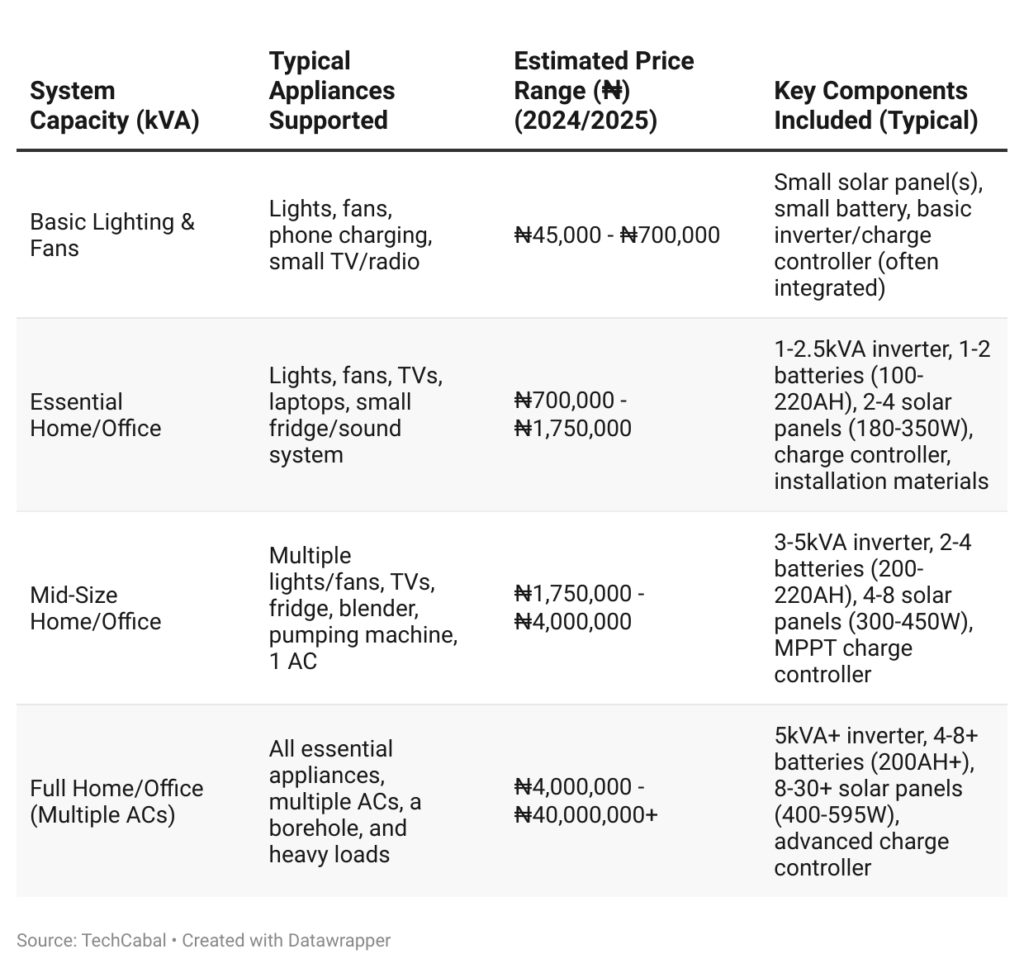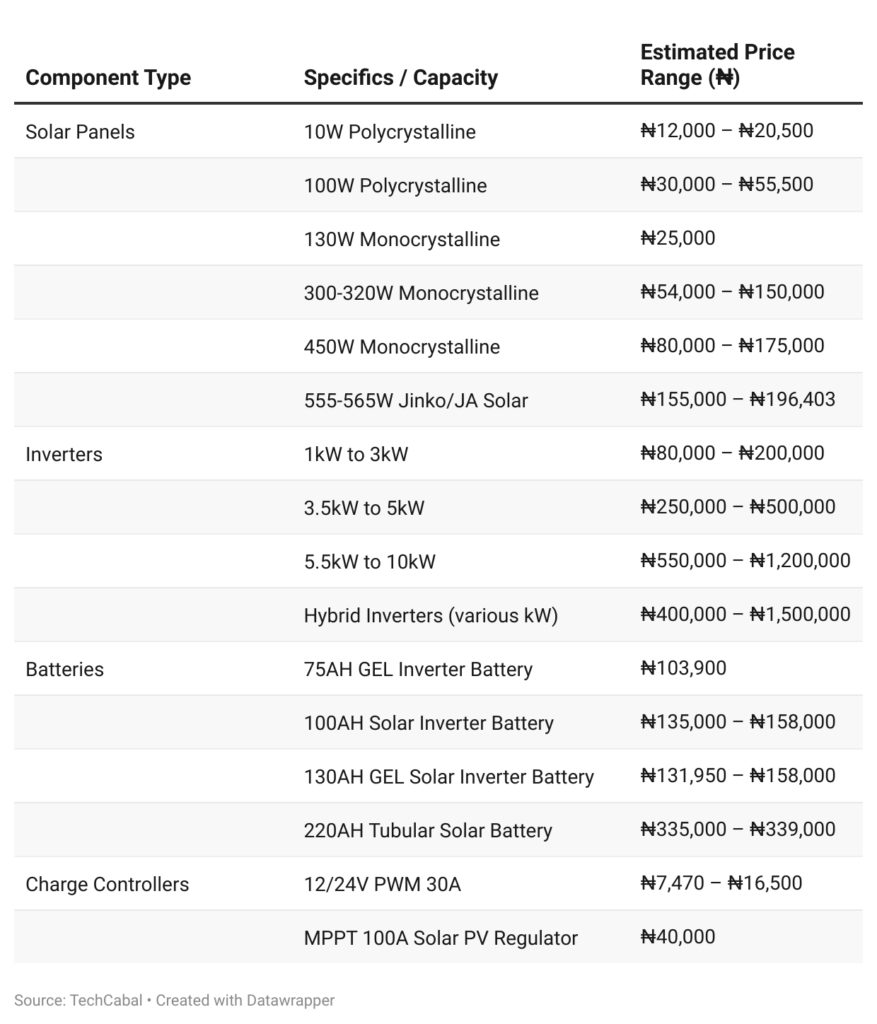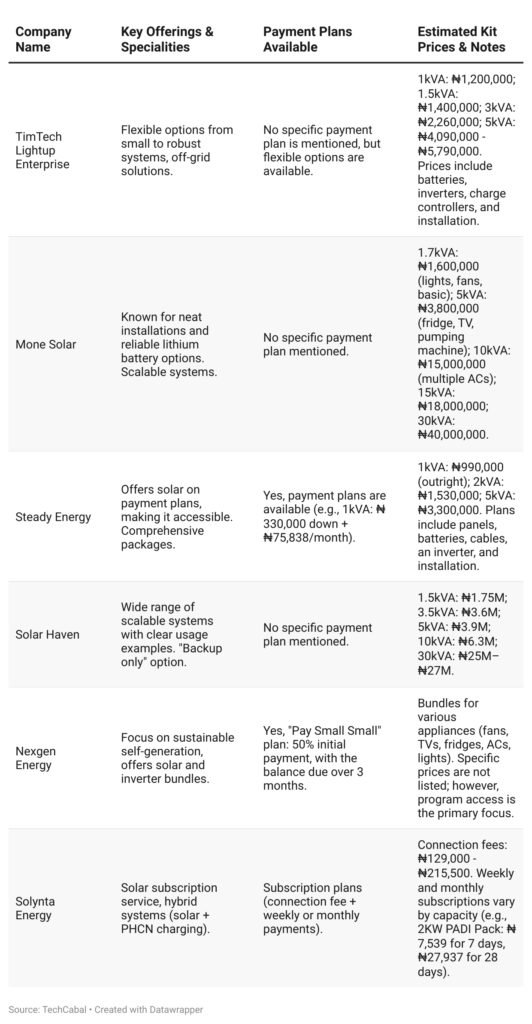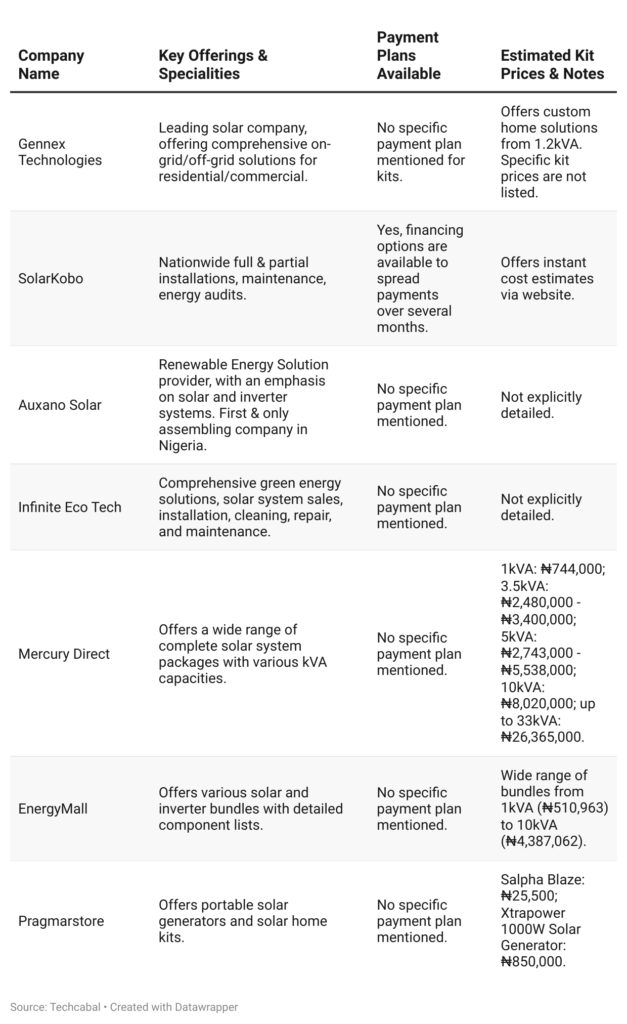Table of contents
It started with a blackout. The kind that catches you just as you’re about to iron your clothes or charge your phone before heading out. I looked at my dead sockets, then at my fuel-sipping generator, and sighed. Again.
That day, I told myself, “There has to be a better way.” I’d heard people talk about solar, but it always sounded like something rich folks or tech bros figured out. But when I finally sat down to understand it, I realised: it’s not that deep. Once you know what you need, what it does, and where to buy it, setting up a solar system isn’t as complicated as people make it sound.
This article is everything I wish I knew from the start: clear, simple, and straight to the point. If you’re tired of blackouts and ready to power your home, office, or shop with solar, this is for you.
Why solar power is a smart move
Solar power has clear benefits:
- Reliable energy: Nigeria receives 6–9 hours of intense sunlight daily. That’s free power you can tap into.
- Significant savings: After the initial cost, solar helps you eliminate fuel expenses and lower your monthly power bills. In 3–5 years, most systems pay for themselves.
- Cleaner environment: No smoke, no noise. Solar helps reduce air pollution and cuts down on harmful carbon emissions.
- Low maintenance: Simply clean the solar panel periodically. No fuel runs, no oil changes.
What is a solar system?
A solar system isn’t as complicated as it sounds. It’s just a team of parts working together to turn sunlight into electricity you can use for your home, office, or shop.
Here’s how it all comes together:
1. Solar panel:
These are the dark panels you see on rooftops. They absorb sunlight using tiny cells (called photovoltaic or PV cells) and produce DC (direct current) electricity.
That’s your first source of power, but your appliances don’t use DC, so it needs to be converted.
2. Inverter:
The inverter takes the DC power from your panels and converts it into AC (alternating current), the kind your fridge, TV, fan, or sockets need.
There are different types of inverters:
- String inverters (most common and affordable)
- Microinverters (go under each solar panel, good if your roof has shade)
- Power optimisers (help boost performance before power reaches the inverter)
3. Battery:
The battery stores extra power for use during nighttime or in the event of a blackout. Most people now go for lithium-ion batteries. A technician at Fixr Technologies Solar told me they’re “longer-lasting and need less maintenance than lead-acid ones.”
4. Charge controller:
This part manages how electricity flows into your battery. It stops overcharging, over-draining, or overheating. The technician added that “MPPT charge controllers are more efficient, especially for bigger systems.”
5. Mounting & wiring:
Your panels are typically installed on a metal frame, usually on your roof. Wires connect everything: the panels, the inverter, the battery, and your fuse box. Proper wiring and installation are super important; it’s what keeps your system safe, efficient, and long-lasting.
Types of solar panels and how they perform
Nigeria receives a significant amount of sunshine, making it an ideal location for solar power. However, due to the heat and humidity, you need to select solar panels that can withstand the weather and continue to perform well over time.
1. Monocrystalline panels – High efficiency, great for small roofs
These panels are made from pure silicon and usually look black. They work very well in hot weather and have the highest efficiency, around 20–22%. That means they generate more electricity from the same amount of sunlight. They’re perfect if your roof space is small and you want to maximise power from fewer panels.
The downside? They cost more. But they also last longer and give better results over time, especially in Nigeria’s hot climate.
2. Polycrystalline panels – Budget-friendly for bigger spaces
These solar panels are made from many silicon fragments and have a blue speckled finish. They’re not as efficient, around 16–18%, especially when the weather gets too hot. But they are cheaper, so they work well if you have enough space and want to keep costs low.
You may need more panels to get the same amount of power as monocrystalline ones.
3. Thin-Film panels – Flexible but less common
Thin-film panels are lightweight and bendable. They’re easy to install on uneven surfaces or in temporary setups. However, their low efficiency means you’ll need significantly more space. That’s why they’re not common in Nigeria.
How much does solar cost in Nigeria?
The cost of going solar in Nigeria can vary significantly. It depends on the amount of power required, the type and quality of components, and the complexity of the installation. However, before considering price, the first and most crucial step is to understand your energy needs.
Step one: Know your power needs
To size your solar system properly, list the appliances you want to power and indicate how long you use each one each day. You can also check your past electricity bills to see your average energy use in kilowatt-hours (kWh).
For accurate results, it’s best to get a professional energy audit. A solar installer can assess your roof size, sunlight exposure, and the number of appliances you have. This helps avoid costly mistakes, such as buying a system that’s too small or too large.
Table 1: Estimated solar kit prices in Nigeria by capacity
Here’s an estimated guide to the costs of different solar system sizes in Nigeria. These prices are estimates only and are subject to change based on the brand, supplier, and inclusions.

Table 2: Average individual solar component prices in Nigeria
If you’re planning to build your system from scratch or want to upgrade it later, knowing the cost of parts can be helpful. Keep in mind that cheaper parts may save you money now, but they often come with higher maintenance or shorter lifespans.

What about installation costs?
Aside from the solar panel and batteries, you’ll need to pay for installation. Here’s what to expect:
- Basic labour costs can range from ₦100,000 to ₦350,000.
- Full system installation, including materials and labour, often ranges from ₦2,000,000 to ₦5,000,000.
What you pay depends on:
- Location: Prices vary depending on your state and the availability of skilled installers in your area.
- Roof access and design: A difficult roof or custom mounting may increase cost.
- Permits: In cities such as Lagos or Abuja, you may need to obtain permits from the Nigerian Electricity Regulatory Commission (NERC). These can add extra costs.
Tip: Some installers quote only for labour, leaving out parts, permits, or mounting frames. To avoid surprises, always ask for a full, itemised quote so you know exactly what you’re paying for.
Solar providers in Nigeria and what they offer
The table below shows some reliable solar providers in Nigeria. It includes what they offer, whether they allow payment in instalments, and the kind of after-sales support you can expect.

Table 2:

Who supplies or builds solar components?
Most solar panels, inverters, and batteries in Nigeria are still imported from abroad. This means that delays, price changes (due to foreign exchange fluctuations), and issues with sourcing replacement parts are standard. However, some local companies are now assembling components here in Nigeria, which is helping reduce costs and speed up repairs.
Key importers and distributors include:
- Tikweld Welding Supplies: Offers a variety of inverters and batteries.
- ME3 Energy supplies solar panel, inverters, and various types of batteries.
- Jumia: Hosts several sellers for solar kits and parts.
- Others: Greenlight Planet, MBH Power, Fouani Nigeria, and Daybreak Power, among others.
Payment plans that make solar more affordable
The biggest challenge for many is the upfront cost of solar. Fortunately, some companies now offer flexible ways to pay:
- Instalment plans:
- Nexgen Energy: Pay 50% upfront and spread the rest over 3 months.
- Steady Energy: Offers both full purchase and monthly plans.
- SolarKobo: Financing options available with negotiable terms.
- Subscription-Based Models:
- Solynta Energy: Pay a connection fee and purchase power credits on a weekly or monthly basis. Many customers say this costs less than using a generator.
What Nigerians who’ve gone solar want you to know
We spoke to several Nigerians who have made the switch to solar energy, as well as professional installers who have been in the field for years. Here’s what they had to say about getting it right.
1. “Don’t guess – get an energy audit”
Ibukun, a solar installer in Lagos, said one of the biggest mistakes people make is guessing their energy needs. “A lot of people call me and say they want to power their house, but when I ask for their electricity usage or the appliances they use, they don’t know. That’s dangerous,” he said. “Start with a proper energy audit. It saves you money in the long run.”
2. “South-facing solar panel works best.”
I live in Ibadan, and when I was setting up my solar system, the installer advised me that the solar panel should face south at a slight angle to capture the most sunlight. We also checked to ensure that nothing, including no trees or buildings, was blocking the sun. It made a big difference.
3. “Buy quality – It saves you trouble later”
Many users echoed the same thing: don’t go for the cheapest system. Israel, a tech bro in Lagos, said, “I went cheap the first time and regretted it. The inverter failed after six months. Now, I only buy from known brands, even if it’s more expensive. It lasts longer and gives me peace of mind.”
4. “Clean your panels – It’s simple but important”
Dust is a real issue. Ibukun, the installer in Lagos, explained: “People forget to clean their panels. You should wipe them down every few months, especially during the dry season. Dust reduces power output. Talk to your installer about regular maintenance.”
5. “Always add a battery.”
Ibukun also added, “Without batteries, you’ll still suffer when NEPA takes light. My batteries give me power at night and during blackouts. I don’t touch my generator anymore.”
Across these conversations, the message was clear: take your time, ask questions, do it right the first time.
Final thoughts
That blackout was my turning point, and maybe this guide will be yours.
Start with what you need. Get an energy audit. Choose quality gear. Work with someone who knows what they’re doing and offers support after installation. It doesn’t have to be perfect from day one. Just smart, reliable, and built to last.
With the proper solar setup, you’re not just buying power; you’re buying peace of mind.
from TechCabal https://ift.tt/G6Dh4Ol
via IFTTT

Write your views on this post and share it. ConversionConversion EmoticonEmoticon